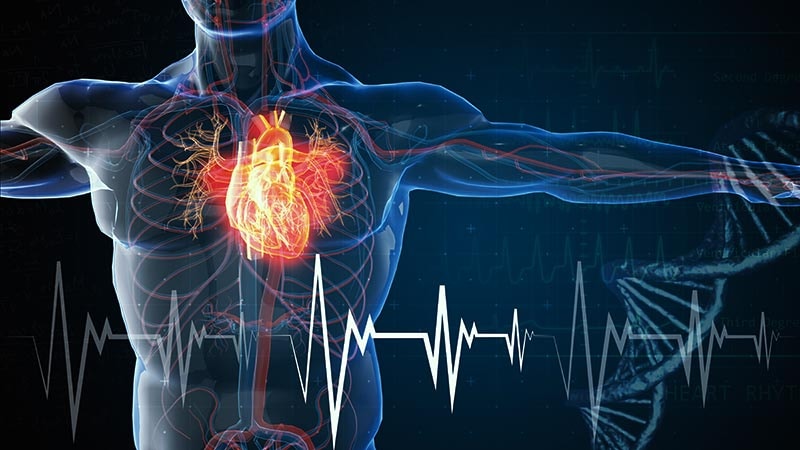Vagus Nerve Stimulation Reduces Orthostatic Tachycardia in POTS Patients
Conceitos Básicos
Vagus nerve stimulation reduces orthostatic tachycardia in POTS patients.
Resumo
TOPLINE:
Vagus nerve stimulation reduced orthostatic tachycardia in POTS patients.
Possible mechanisms include decreased autoantibodies and inflammatory cytokines, and improved cardiac autonomic function.
METHODOLOGY:
25 female POTS patients underwent transcutaneous vagus nerve stimulation (tVNS) or sham stimulation.
Patients self-administered tVNS daily for 2 months.
Tilt tests and blood samples were used to assess outcomes.
TAKEAWAY:
Postural tachycardia significantly reduced in the active tVNS group.
Decrease in autoantibody activity and cytokine levels observed.
Heart rate variability improved in the active group.
IN PRACTICE:
tVNS may be a beneficial intervention for POTS patients.
SOURCE:
Study led by Stavros Stavrakis, MD, PhD, University of Oklahoma Health Sciences Center.
LIMITATIONS:
Small sample size, limited to females, and short duration.
No improvement in patient-reported outcomes.
Optimal tVNS duration and timing require further study.
DISCLOSURES:
Study supported by NIH and individual donations, no conflicts of interest.
Vagus Nerve Stimulation Promising In POTS
Estatísticas
"At 2 months, postural tachycardia was significantly less in the active vs sham arm (mean postural increase in heart rate 17.6 beats/min vs 31.7 beats/min; P = .01)."
"There was a significant decrease in β 1 -adrenergic receptor (β 1 -AR; P = .01) and α 1 -AR (P = .04) autoantibody activity in the active vs sham group."
"Serum tumor necrosis factor-α (TNF-α) levels were significantly decreased in the active group relative to the sham group (8.3 pg/mL vs 13.9 pg/mL; P = .01)."
Citações
"Collectively, these data suggest that tVNS, a low-cost, low-risk intervention, applied for a short period of time in selected patients with POTS, may result in a significant amelioration of their disease."
Principais Insights Extraídos De
by Pauline Ande... às www.medscape.com 11-29-2023
https://www.medscape.com/viewarticle/998913
Perguntas Mais Profundas
How can the findings of this study impact the treatment of other autonomic disorders?
The findings of this study suggest that vagus nerve stimulation (VNS) could be a promising treatment option for other autonomic disorders beyond postural tachycardia syndrome (POTS). By demonstrating a reduction in orthostatic tachycardia, decreased levels of antiadrenergic autoantibodies and inflammatory cytokines, and improved cardiac autonomic function in POTS patients, this study opens up possibilities for applying VNS in conditions characterized by autonomic dysfunction. The potential impact lies in the modulation of autonomic responses through VNS, which could be beneficial in managing symptoms related to other autonomic disorders such as autonomic neuropathies, dysautonomia, and other forms of orthostatic intolerance.
What potential drawbacks or limitations might be associated with the use of vagus nerve stimulation in POTS patients?
While the study shows promising results for vagus nerve stimulation (VNS) in POTS patients, there are several potential drawbacks and limitations to consider. Firstly, the study had a small sample size and included only female participants, limiting the generalizability of the findings to a broader population. Additionally, the study duration was only 2 months, raising questions about the long-term efficacy and sustainability of VNS in managing POTS symptoms. Furthermore, the lack of improvement in patient-reported outcomes, as measured by the Composite Autonomic Symptom Score 31 (COMPASS-31) questionnaire, suggests that VNS may not address all aspects of POTS-related symptoms. Moreover, the optimal duration and timing of VNS therapy remain unclear, highlighting the need for further research to determine the most effective treatment protocols for POTS patients.
How can the concept of vagus nerve stimulation be applied in other medical conditions beyond POTS?
The concept of vagus nerve stimulation (VNS) explored in this study holds potential for application in a wide range of medical conditions beyond POTS. VNS has been investigated in various neurological and psychiatric disorders, such as epilepsy, depression, and migraine, where modulating the vagus nerve activity has shown therapeutic benefits. In addition, VNS has been explored in inflammatory conditions like rheumatoid arthritis and inflammatory bowel disease, where the anti-inflammatory effects of VNS could be beneficial. Furthermore, VNS has been studied in cardiovascular conditions like heart failure and arrhythmias, showcasing its potential in regulating cardiac autonomic function. By leveraging the therapeutic effects of VNS on autonomic modulation, inflammation, and neurologic pathways, this approach could be extended to diverse medical conditions to improve patient outcomes and quality of life.
0
